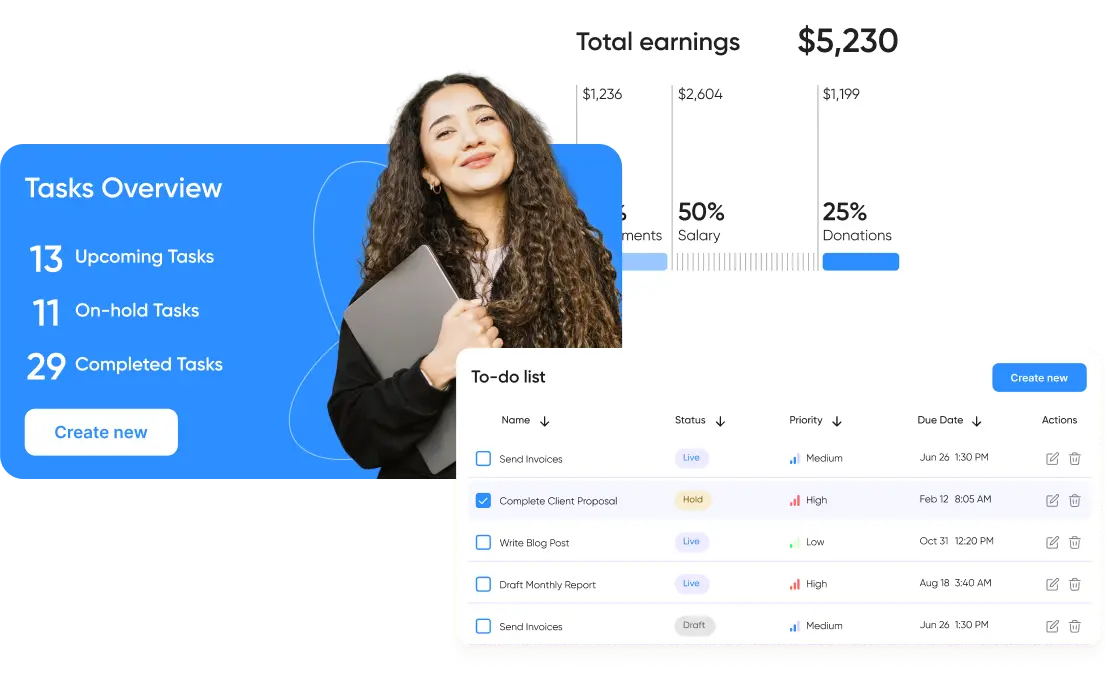Outsourcing
Why Your Startup Needs a Technology Delivery Manager and How to Choose the Right One
If you are a startup, chances are you're trying to do a lot of things at once. You're probably focused on your product, and you might even be working on hiring some people to help you get it off the ground. When you add in the fact that your company is growing quickly and needs to keep up with the demand for products or services, it can be overwhelming.
In the ever-changing tech landscape, a technology Delivery Manager is needed by everyone, everywhere and always.
Delivery Manager (DM) is a relatively new name for a management role in IT. In the context of the IT business, Delivery means the entire path of delivering a product/solution/service to a client: from the first business contact to the completion of cooperation. And a technology Delivery Manager is responsible for the success of this Delivery. He or she creates the environment, sets the direction, and selects tools to help the team plan and execute complex digital projects.
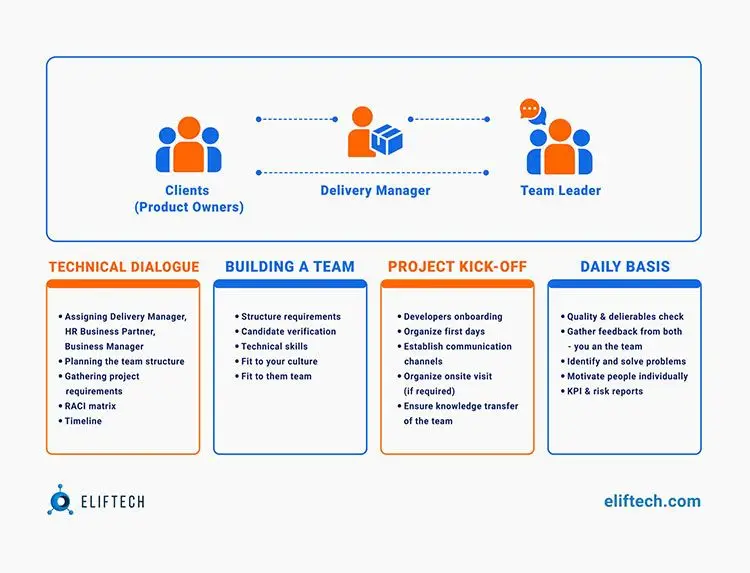
Technology Delivery Manager to the Rescue: What is DM Responsible For in a Project?
The DM is responsible for which people get on the project, what technologies the project owns, what and when the team should do, and how much it will cost to implement and deliver the solution to the customer.
To explain the value of Delivery for a client, I will give an example. In 2020, highly effective Covid vaccines were developed - a chance to beat the global pandemic. One of the key challenges after development was logistics. Delivery of vaccines has strict requirements for storage and accounting. This requires technological solutions to track logistics from the manufacturer to the end consumer in real time. Vaccine manufacturers cannot quickly deal with such problems. Therefore, such solutions were developed and implemented by partners - technology companies with the necessary expertise (for example, Blockchain or Internet of Things - IoT).
This is what Delivery Management is all about: identifying a problem, finding solutions (for example, Blockchain technologies and temperature sensors on the packaging), and suggesting the best ways to move a valuable product. In this case, the technology Delivery Manager helps with technologies and resources and is responsible for implementing the task as a whole. The result of successful product delivery is saving lives around the world.
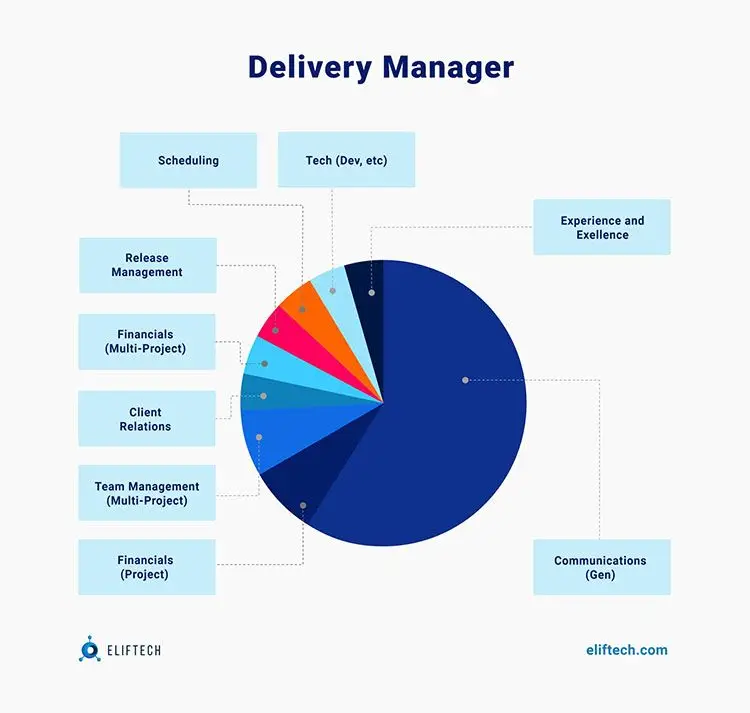
Where Did the Role of Technology Delivery Manager Come From?
A DM is an employee with good leadership and business skills whose specialization borders on the architect on the one hand and the Project Manager on the other. There still needs to be more about technology Delivery Managers - the institution of the profession still needs to be created.
This approach comes from organizations that have long held the position of Service Delivery Manager (SDM). But this concept is different from Delivery Manager. Service is a repeatable thing. For example, PayPal is a service that makes payments millions of times a day, and the person responsible for its work is the Service Delivery Manager.
When there is a team capable of implementing the project, and a technical background (when you know that it can be done), the process of creating a solution begins. But, at the same time, it is not the process, not the organization, that is important, but the end result - the product. And delivery management is just management to achieve results.
What Is the Role of the Delivery Manager?
The Delivery Manager's role and distribution of responsibilities depend on the project stage. First, the DM expects a lot of talk about the customer's problems and how to solve them. It is closer to business requirements, product management, and solution architecture.
Then the classic program or product manager (depending on the amount of work) is turned on, which calculates: risks, the schedule of the entire project, the need for specialists, the approach in which they will work, the details of the implementation of the system, and implementation.
When the project is already in development, the DM works daily with the questions: "What is critical to do today? What are the risks and issues that put Delivery at risk? What are the opportunities for success, and what needs to be done for them now?"A risk-based approach allows you to notice the problem in advance and solve it so that it affects the delivery time as little as possible.
There is a certain set of things that the DM must keep an eye on at all times:
- Do we know what needs to be done?
- Are we doing the right things?
- Are we doing the right thing first?
- Are we doing these things right?
To answer these questions, you need to talk with the team regularly, analyze the product's technical details, and pay attention to how the already implemented part of the project works and how efficiently the development processes are built.
The technology Delivery Manager monitors the work done and ensures it brings the team closer to the goal. Most of the DM's job is communicating and solving problems at different levels. In this aspect, the technology Delivery Manager differs from Project Manager in that if the task is related to technology, he or she understands well at what point external consultation is required. Like any engineer, he or she knows that messages may not reach the buses; in the database, it is worth looking for risks in competitive records; IoT devices often run out of memory.
DM's core value is finding the shortest path to solving a problem. His or her work is associated with a deeper awareness of the problems, which reduces dependence on the entire system. If the technology Delivery Manager knows he or she needs a certain expert, communication with him or her will go faster because both people know the problem.
A Delivery Manager is not a specialist but, foremost, a leader whose ultimate goal is to deliver the result to the customer. Delivery Manager sees the whole picture, from beginning to end, integrating the results of individual work centers into a complete solution.
What Does the Project Delivery Manager Do?
Hence, the main tasks of the technology Delivery Manager are the following:
- Product. The Delivery Manager must ensure that the customer and each team member understand what product or service they are developing and for what business problems.
- Plans. Once the requirements are identified, the Delivery Manager must organize the evaluation and planning work. As a result, a calendar and resource plans appear, from which it becomes clear what roles are needed to deliver the result, how many people are in each role, when each person should start and finish work, and what results and when will be obtained.
- Team. If there are plans and confirmation of the start of work, the Delivery Manager assembles a team to deliver the result. Often, key specialists are involved at earlier stages - the analysis and planning phases, because with them, it is possible to form requirements and plan work.
- Architecture. For smaller projects, Delivery Manager can design the solution on his or her own. However, in medium and large projects, the solution architecture is developed by the architect, either alone or as part of a team.
- Process. Organization of the work of a team of people on a single result is a challenging task. And this task also lies with the Delivery Manager. He or she must design the workflow, deliver it and improve it.
- Customer. While doing everything described above, moving towards achieving the result, the Delivery Manager must always keep the customer in mind - about his or her business and goals and the specific people he or she works with daily.
Depending on the situation (format of cooperation, amount of work, availability of specialists of the right profile at the right time, DM expertise), the technology Delivery Manager can perform the listed functions independently or delegate them to experts.
The word Manager in the role title suggests that other things being equal, preference should be given to delegation and focus on organizing teamwork. Otherwise, the employee risks becoming a "snowflake manager" whose growth will be severely limited.
Maximize your startup's potential with a skilled Delivery Manager. Let us know about your project in mind and learn how to make the right choice for your company's success.
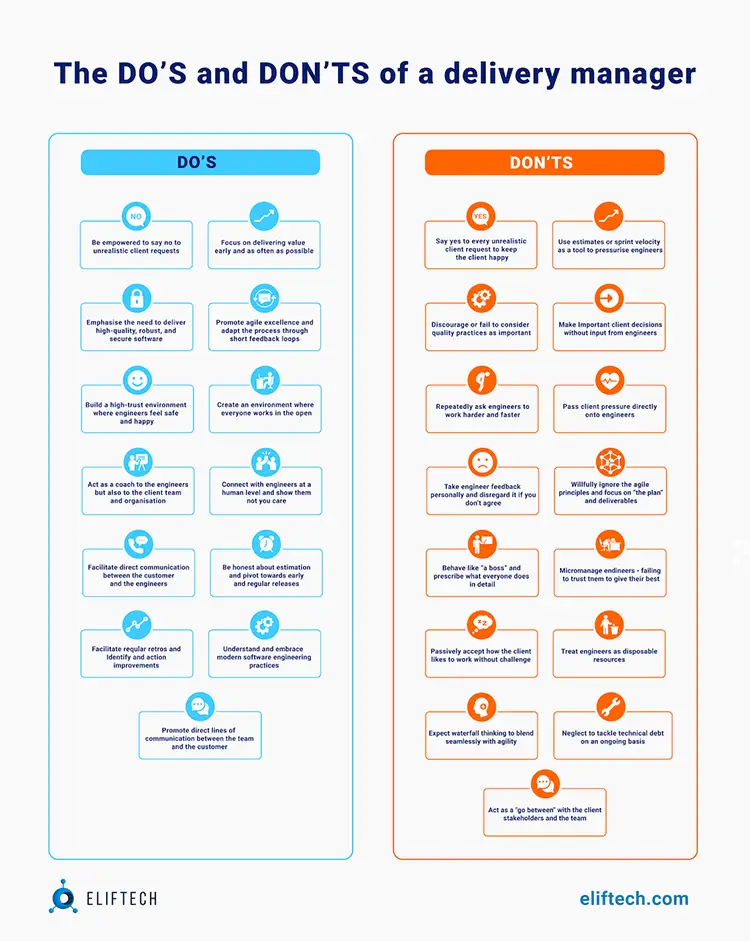
What Is the Core Role of a Technology Delivery Manager?
The Delivery Manager "expands" the project or program manager role, mixing several others - account manager, Solution Architect, Engineering Manager, and People Manager. And since tasks can overlap, in IT companies, the role of DM often needs to be clarified with other specialists.
Yes, the DM has something in common, but in essence, it differs from the role of the Scrum Master, who is responsible for the team's effectiveness and helps understand the framework's theory and practice. And also from the role of the Product Owner, whose task is to maximize the product's value and effectively manage the backlog.
The role of Delivery Manager is more typical for outsourcing companies that provide customer services. But many product businesses and startups also have a similar position: there are usually CTOs or VPs of Engineering with DM qualities.
Read more: In-house Development Team or Outsourced IT Services: Which Is More Beneficial for Your Business?
What Skills Do IT Delivery Managers Need?
The skillset depends on the structure of the DM's duties, but above all, it is:
- Communications. The Delivery Manager interacts with the team, managers, and stakeholders on the client side (for example, project managers or product owners). Communication usually takes up most of the time.
- Managerial and leadership competencies. The DM manages cross-functional teams whose composition depends on the project's needs (often, these are developers, analysts, testers, and designers). This is a high managerial role in terms of the hierarchy in the company and responsibility for the result.
- Finance. The budget is also the area of responsibility of the Delivery Manager.
- Project management. Both classic PMBOK and flexible methodologies such as Agile and Lean.
- Engineering excellence and technology. To create technically perfect solutions, you must correctly and timely apply good engineering practices.
- Business skills. A DM is a client's partner who must understand his or her business domain (retail, banking, fintech, or telecom).
Delivery Manager vs Project Manager: How Does IT Delivery Manager Differ from Other Roles?
The easiest way to tell the difference between a DM and other roles is to compare them by listing the key roles and explaining what their main purpose is - who is responsible for what.
- The Product Manager creates product requirements to enable customers to achieve their goals.
- A Solution Architect designs a solution that will allow the development of a product that meets the requirements, quality attributes, and constraints.
- Resource Manager helps employees develop so each team member can reach their full potential.
- Account Manager develops business, solves financial issues, and builds long-term relationships with the customer.
- The IT Delivery Manager is responsible for ensuring that, as part of the joint work of all the above (and not only) roles, the customer receives a result that allows him or her to achieve his or her goals.
A DM is a conductor who organizes the work of a team to achieve a result. At the same time, the DM should be well versed in all of the above aspects to dive into the details of the problem if necessary and help the team solve it, or better yet, anticipate and prevent it.
In a startup analogy, Account Manager (AM) is the Business Development Director, and Delivery Manager is the Operations Director. AM works with customers and brings orders, and DM fulfills these orders on a turnkey basis.
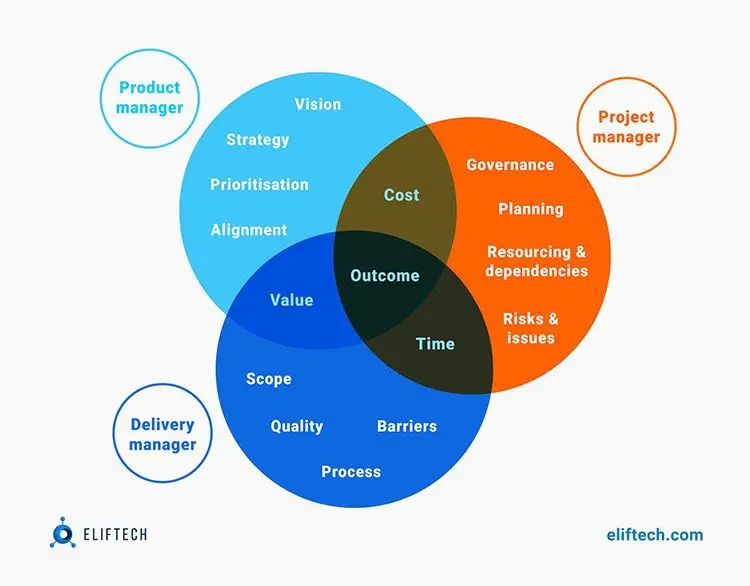
Where Technology Delivery Manager Is in Demand?
In recent years, most companies have been digitally transforming their business. As a result, the IT landscape has long moved from a cost center to a key driver. Therefore, Delivery Manager is in demand and will be in demand in almost any company:
- As a role - everyone needs to deliver results and achieve goals continuously;
- As a position - products are becoming increasingly technological and complex, and understanding the details is necessary to ensure the Delivery of results in tough competitive conditions.
- The Delivery Manager is indispensable because he or she is responsible for delivering the result to the customer and orchestrating the entire team's work.
- The Delivery Manager is the technology leader of the team and is well-versed in software architecture, technology, and engineering practices.
- The Delivery Manager must be able to organize the team's work so that from "nothing," a result is obtained that solves the customer's business problems and satisfies his or her expectations.
To become a Delivery Manager, you must practice management and technology and have deep theoretical knowledge.
Why Does Everyone Need a Technology Delivery Manager on Their Team?
Marty Cagan noticed the trend in the US from Project Manager (PM for short) to Delivery Manager. Marty loves this trend and the new role for three reasons:
- The project manager's 'brand' is so damaged that it may need to be rebranded.
- There is a question about the goal - to complete the product. The task is not to research or teach processes; the goal is solely in the release.
The Delivery Manager is responsible for sorting and prioritizing product issues, freeing the Product Owner. Scrum users agree that the project manager role is so tarnished that it must be rebranded. That is why, according to Mike Cohn (one of Scrum's luminaries), the role of the Scrum Master appeared.
Instead of a Conclusion: The Person Who Coordinates Everyone is a Delivery Manager
Every company engaged in the IT field has tasks the customer sets for. However, to ensure their solution is on time, sometimes one competent person is enough to establish communications with all parts of the project: both with the customer and with all project participants, up to the top management.
In some delivery teams, the manager is responsible for task architecture. However, this is only possible when the project is small. Therefore, attracting a professional architect and making him part of the team for large-scale tasks would still be better.
Here’s how a Delivery Manager in ElifTech can take your project to the next level by improving results and streamlining communication:
1. Drives better results than a Project Manager: A Delivery Manager may share similar responsibilities to a Project Manager. However, Delivery Managers bring so much more to the table. Our Delivery Managers go above and beyond to deliver a successful and quality project; this is accomplished by assisting our clients in thinking critically about their product requirements, ensuring consistent and valuable communication is present throughout the project, and working with our clients to maintain an active role in the development cycle. Rather than ensuring the project stays on course and within the budget, as you’d see with a typical Project Manager, our Delivery Managers take a personal interest in every project they are involved with to ensure its success.
2. Alleviates pressures and concerns: One of the most significant areas of concern when entering the beginning stages of a project’s development cycle is whether you can provide a consistent flow of work to the development team. Providing the development team with constant work is invaluable; it increases productivity, ensures your project is completed as quickly as possible and allows more frequent opportunities to get involved with the development of your project and take an active role in fine-tuning your requirements.
Therefore, the primary responsibility of our Delivery Managers is to assist with requirement identification. This ensures that you cannot only stay a few steps ahead of your development team but also drive the highest level of detail within each requirement. In addition, a Delivery Manager will ensure that any pressures or concerns arising during a development cycle are handled quickly and effectively to provide you with the smoothest experience possible.
3. Eases communication between you and your development team: Delivery Managers must provide the clients with the highest level of communication possible. It leads to higher transparency throughout the project, giving our clients greater involvement. To accomplish this higher level of communication, our Delivery Managers always strive to manage the communication needs between our development teams and the requirement drivers within the client’s organization. Translating technical concepts and terminology between technical and non-technical members and ensuring everyone easily understands them is critical to their role within the team.
4. Develops a sound and forward-thinking product vision: Our Delivery Managers ensure product requirements and the overall product vision have been identified and thought through. Anyone can accept a new project, identify requirements, and start development. Still, our Delivery Managers ensure your product’s vision is sound, well-thought-out, and forward-thinking.
We want to ensure that our clients are happy with our results for as long as possible, not just for a few years until a new technology comes along and you need to upgrade. With our Delivery Managers, we can foresee the ever-changing landscapes of the technological world and make well-informed decisions regarding our client’s product vision and its technologies.
5. Ensures a successful and quality deliverable: Delivery Managers are outstanding resources that will have an incredible impact on the success of any project. By going above and beyond what a typical Project Manager would do, they ensure that a project is set up to succeed.
Each benefit we’ve covered is part of the management “stack” or toolkit each delivery manager brings to the table. Through their valuable contributions to a project, we can ensure the success and quality of any deliverable we produce while staying within budget and following agreed-upon deadlines.
Take charge of your startup's delivery process with a Delivery Manager. Let us know about your project, and our experts will provide essential insights on why and how to choose the right one.
Browse our case studies and get actionable insights to drive your success
See more